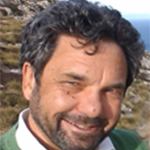

 Prof. Michael Farle
Prof. Michael Farle Michael Farle obtained is Ph.D. degree in experimental condensed matter physics from the Free University Berlin, Germany in 1991 . He was appointed a full professor at the Technical University Braunschweig in 1999 and moved in 2002 to a professorship (C4) at the University of Duisburg-Essen. Farle has been the coordinator of two Research Training Networks funded by the European Union (5th/6Th framework), the vice-speaker of the collaborative research centre 491, and the host to a Marie Curie Excellence Grant Holder. From July 2008 to Dec 2010 he has been the vice-president for research at the University Duisburg-Essen (UDE). Since 2012 he is the chairman of the magnetism section of the German Physical Society. He is heading a group of about 20 people (postdocs, Ph.D. , master students and technicians). The research of Prof. Farle’s group focuses on the magnetic properties of novel low-dimensional magnetic structures (nanomagnetism). This involves the preparation of nano-structured, multifunctional materials by various techniques ranging from magnetic mono/multilayer deposition in UHV, to the self-organized assembly of colloidal systems consisting of superparamagnetic nanoparticles. In his research, he has specialized in techniques like microwave spectroscopy (Electron spin and Ferromagnetic Resonance), molecular beam epitaxy and transmission electron microscopy. Farle has published more than 220 papers in peer reviewed journals and co-edited two books.
Magnetism in structures with dimensions on the few – nanometer scale have been the center of many investigations ranging from topics in spin-torque and spin-injection dynamics and interactions in biomedical applications to the creation of new types of hard, soft or multi-functionalized materials. Such nanostructured “building blocks” offer new exciting possibi¬li¬ties to create new artificial materials. In biological and medical technologies magnetic hybrid or functionalized particles find applications in site-targeted therapy, diagnosis, cell separation and water purification. For innovations in electro mobility and wind harvesting new lightweight motors and generators are needed which require the design of new types of permanent magnets – again based on magnetic nanoscale building blocks. The talk will give an introduction to the state of the art and address the challenges for tailoring the properties of such building blocks. New functionalities can be obtained based on the intelligent combination of magnetic and non-magnetic materials.